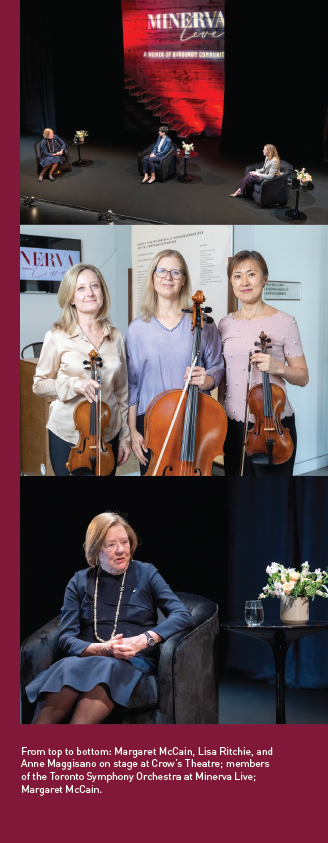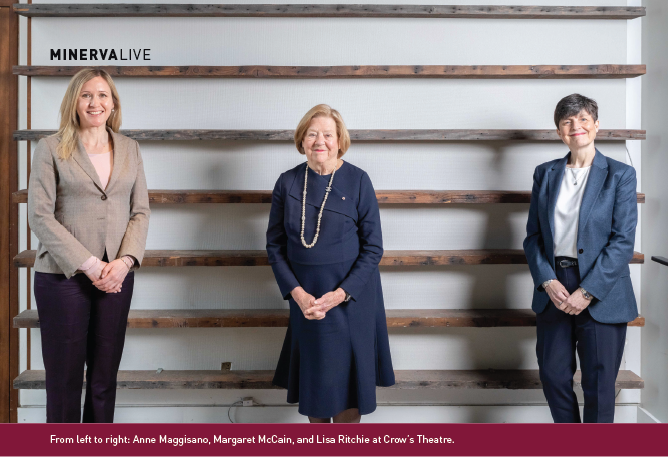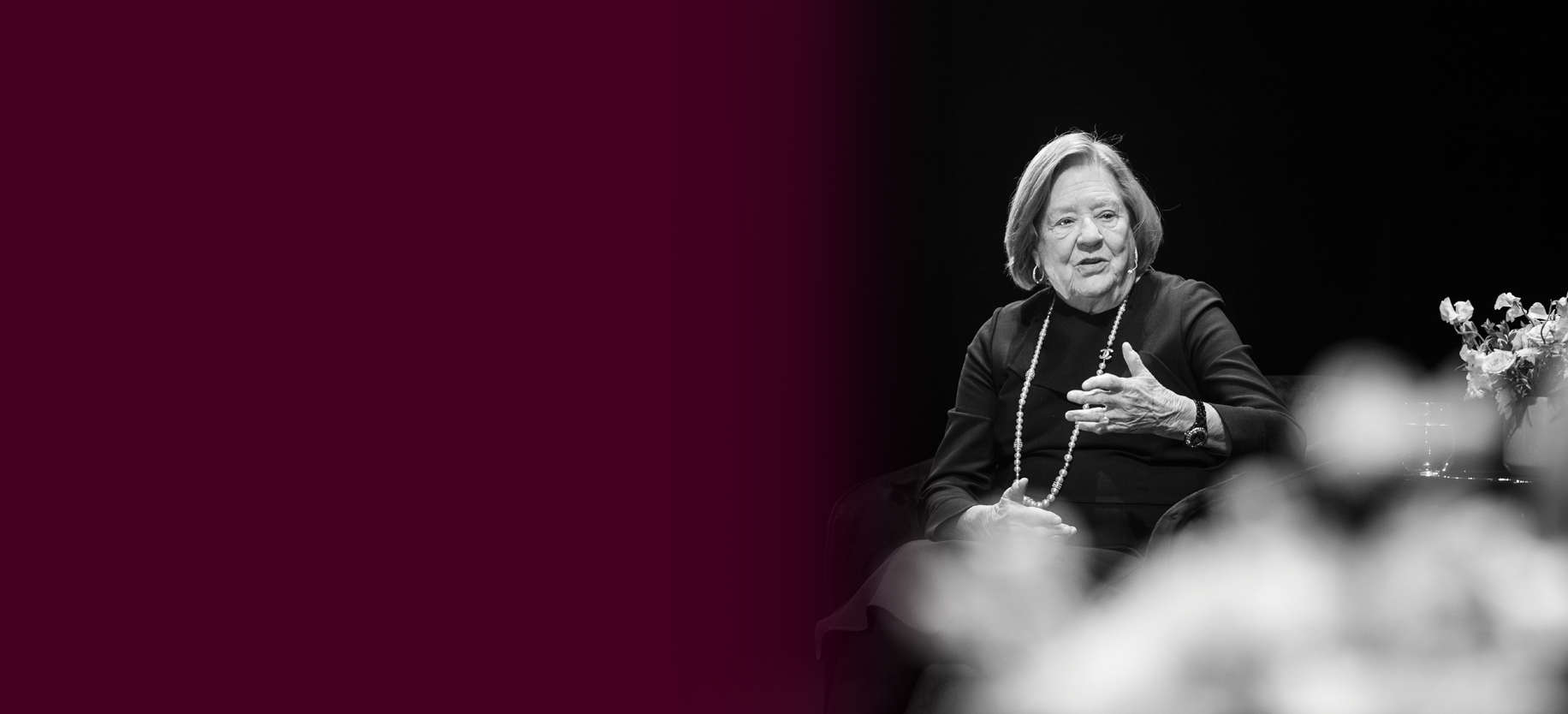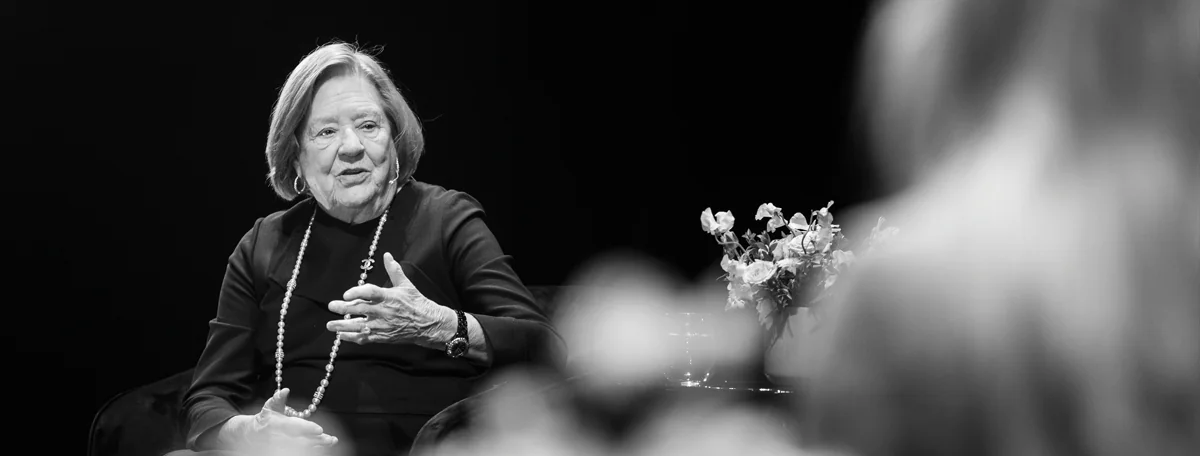In June 2022, the Women of Burgundy hosted an intimate evening with the Honourable Margaret “Margie” Norrie McCain, one of Canada’s most prominent philanthropists, an advocate for early childhood education, and the first woman to serve as lieutenant governor of Nova Scotia. In conversation with Burgundy vice presidents Lisa Ritchie and Anne Maggisano, McCain shared her story of finding financial empowerment, how she worked to change the culture of her family, and her approach to philanthropic giving for the betterment of our community.
Lisa Ritchie (LR): Philanthropy is about more than just money, but we also want to delve into the financial side of giving. The ability to give financially is one of the ultimate expressions of financial empowerment. How did your giving journey start, and how do you structure your financial giving?
Margaret McCain (MM): I was truly fortunate and very blessed. Quite early on in my relationship, my husband, who generated the wealth that I am able to give away, gave me the chequebook and pretty much full say over where our philanthropic dollars were going to go. I had two or three specific areas of interest about which my husband knew nothing. But he trusted and had faith in me, and he let me make these decisions. We slotted our philanthropy into three specific areas. One was strategic, which was our foundation that focused solely on early education coast to coast to coast.
Second, particularly after my husband was diagnosed with a terminal illness, we knew that there would be legacy gifts after he died. Together we decided they were going to go to universities and healthcare institutions. There will be more legacy gifts after I die.
And there is also a pocket of what I call charitable philanthropy—like annual support for a women’s shelter and tables for umpteen fundraisers. I cannot say no to anything if, after I do my due diligence, it seems worthwhile.
LR: If we think back 30-, 40-plus years, financial empowerment for women would not necessarily have been the norm. What did you experience as the cultural and societal norms around women and money early on?
MM: First, it took me a while to reach the stage of being empowered. I am almost 88. My life was shaped before the women’s movement. I did not even know what the word feminism meant. My mother was a feminist before me because she was a widow (and so was my mother-in-law),and widowhood gave women a form of independence that was respected. If you were married, it was generally not your right to make decisions around money. I was lucky because my husband was not the norm. However, I learned over time that, unlike me, many women of means did not have the power to say where their philanthropic dollars were going to go. That came as a shock to me.
Most philanthropic dollars were inherited—they came from a father or husband who had died. And there was a degree of fear amongst women who had not generated the wealth that, if it disappeared for whatever reason, they would not have the power, or the talent, or the skills to replace it. Today, things have changed because many women are generating wealth themselves and have the full power and the right to say where the dollars go. I love that this has happened.
“Today, things have changed because many women are generating wealth themselves and have the full power and the right to say where the dollars go. I love that this has happened.”
Anne Maggisano (AM): When I think of your journey, there was a desire for independence, which was born from your relationship with your mother and seeing how she lived her life. Give us a sense of your mother and how she was a role model for you.
MM: My mother was a role model, best friend, and mentor. I adored her. I also adored my father. I was blessed to have been raised in a family filled with love. I do not ever remember a moment of tension between my parents. They had full respect for each other. I inherited that.
But my mother was widowed at 39 with four little kids. From then on, she had to take charge. was the first woman to run for public office in Nova Scotia. She was the first woman appointed to the Senate in Nova Scotia. She was a social activist and a feminist. I had my own voice—my mother gave me a voice, and I had the experience of going to an all-girls school and a very female-friendly university, where we were all encouraged to have a voice.
Then I married a man who I loved dearly, but I was unaware that I was moving into a very patriarchal family and community, and it hit me like a tsunami. Suddenly, my voice was no longer respected. I wanted my marriage to succeed; I wanted an intact, happy family. So, I played the traditional role of the day, and he played the traditional role as he thought he was expected to do. But I had lost my voice. I had lost a lot of control regarding my life, our schedule, friends, even what I wore.
Because my husband was busy building a multinational business and I was busy raising a family, it was about 15 years into our marriage before I realized that I was sliding into a depression. I was trained as a social worker, so I recognized the signs and decided I had to take charge. I had to find Margie again. Little by little by little, I found my voice again, took back my core self, and let go of the pseudo self that I had adopted. My husband grew with me. There were times when he would say, “Hey, what is happening here? There is a change going on.” For example, [he once said], “You don’t dress for me anymore.” My answer: “No, dear. I don’t. I dress for me. And if you like it, you can tell me. If you don’t like it, keep it to yourself.”
I took charge of one key thing early on [in our relationship] that really went against both the family norm and the community norm. I needed my husband to be a full participating parent. We only had our two sons then, and they needed him, so I broke with tradition and pulled him into equal parenthood. Sometimes he thought I was abdicating my maternal role, my obligation, and I just let that opinion slide off me. Until suddenly, he realized it was as important to him as anything else that he did. And, over time, I took on larger volunteer responsibilities outside of the home. I became involved in the university. I became involved in the establishment of an organization for the elimination of violence against women, which was important to me. And my husband participated with me in raising money to endow its research centre.
I continued to grow and became a fully independent woman. At the same time as I was appointed lieutenant governor of New Brunswick, my husband needed to move to Toronto, where he was building a company. We began living a long-distance life. We were in our 60s and 70s, and our whole relationship changed. But I have to say that it got better. The more equal I became, the stronger our relationship became. And he grew with me. That is the wonderful part.
AM: Margie, you talk about starting to take steps to have a voice and to change the culture within your family. What was that experience like? Especially as you started to ask for and express more interest in getting involved with the finances?
MM: I am not going to pretend it was always easy, because I was making changes within a patriarchal culture. Some of it happened quietly. I was not stomping my feet and making signs of rebellion. I was doing it in a slow, incremental way. But my husband eventually realized the changes I was making were taking me away from home a lot. That began to create some tension between us until I sat him down one day and I said, “We need to talk.” And then I said, “You know, I will always put my family first because that is my first love. I will always put you first. But you have a choice: half of a happy woman or all of an unhappy woman.” My husband said, “Well, that is no choice. I want a happy woman.”
AM: And at some point, because he knew your desire for independence and he wanted to help you, he gave you a fund to manage yourself.
MM: He did. And that was early on. When I think of it, it was quite a thing. He wanted to know I would always be independent and have the means to leave if I felt I needed to. He wanted the comfort of knowing that I stayed in the marriage because I wanted to be there, but there was an exit door if I needed it, and he increased the fund every year.
AM: In giving you that money early in your relationship, your husband gave you the time to learn while he was there, so you could experience what it meant to manage the money and always have him as a resource. When your husband passed away, did you feel you had the resources and the confidence to manage the money yourself?
MM: Yes. I feel fully in control, fully empowered. But I also have a team around me that I trust to find the right people to manage our money. And I have only one directive: Make sure I do not run out. So that is why we have trusted investment managers like Burgundy Asset Management. I am not an expert as a doctor either, or a nurse. I rely on experts who I trust. You can go to people who can teach you, at least to be an overseer, to know enough that you have a general idea. I am informed, but I do not pretend to be an expert.
AM: It is a wise observation. So often, we meet with people who believe they should know everything around investing. And one of the most important things to do when you are stewarding wealth for many generations is surround yourself with people who are constantly learning and engaged in the discipline, so that at any time when you have a question and you don’t know what to do, you know who to ask. It is a very sound strategy to ensure that you are stewarding your assets for the long term and protecting yourself.
And if you think back, Margie, as you have gone through this journey, what does financial empowerment give to you as a woman?
MM: Empowerment period—not just financial, but personal empowerment. It is something that every human being should try to achieve for their own personal health. In fact, I gave a speech at York University when I received an honorary degree on the social determinants of health. I was speaking to health sciences students and [brought up] three things. First is having power over your personal and professional life. That does not mean you impose your power on other people; it means you make personal decisions that are good for you. It means having a voice in the doctor you choose, the financial experts you choose, and the politicians you vote for. Every person needs to find their voice in choosing who will represent us in making our laws and keeping our democracy healthy. That is empowerment in every aspect of your life. The second thing that I said to the students is to have control over your own self, but nurture intimate relationships. Third, participate in your community and ensure that you are contributing to its health.
AM: Let’s switch now to the pandemic, which has been a health crisis and also a social and economic crisis. What has been exposed is the link between economic health for an individual and social outcomes. What have you learned from the pandemic that can inspire women to take more of a leadership role over their money?
MM: It does not matter what your income level is, having control over what you have is directly correlated to your own personal physical and mental health. And yes, the pandemic has taught us that.
The pandemic was also a trigger to bringing forth a national early learning plan, in which I have been deeply involved. It was the fulfillment of a big part of my life’s work. It will put women back to work and give them an equal opportunity to have a family, raise children, and still be the dominant force in their children’s lives. My dream is that we provide that support system so that women can be fulfilled in their professional and their parental lives, feel good about both, and not feel guilt.
It has to be configured around the parents’ work status, but it is there for the children regardless of whether the parents are working or they are not working. It may give the parent the chance to go to school, or if they have personal challenges, such as a mental health issue, to take time out. The child will be well cared for and can stay in the system. So, that’s my life’s work fulfilled. The government finally drank the Kool-Aid in January 2020. I have been working with them ever since, and I’m very happy about that.
One young woman said, “This will be as liberating for women as the pill.” Amanda Lang on BNN said while interviewing me: “I do believe this is as important to our social and economic health as universal healthcare.” It will be critically important to the social/economic prosperity of our country in the future, preparing people to function in the technological, digital world. All people, equally.

AM: You have been an advocate for women your entire life. Give us a sense of whether you think progress has been made and what barriers or obstacles still need to be overcome.
MM: The word feminism did not exist in my world. But then suddenly, I saw that my mother was a living feminist before I was. She did not put pressure on me. She let me figure it out for myself.
When I became lieutenant governor, one of the first visitors I had was a clergyman. He requested an appointment. And he sat down with a big smile on his face, and he said, “By the way, your honour, I just heard someone say that the lieutenant governor is a feminist.” Now for him, “feminist” was a bad word. I smiled back and I said, “Well, that person got it right. I am a feminist, and I expect you are too.” He seemed a little taken aback and said, “Well, how do you mean?” And I said, “Do you believe in equality and justice for women?” His reply: “Well, yes.” I said, “Then you’re a feminist. “You must remember, sir, that feminism is like religion. We practice it in many different ways.”
We went through a period when young women wanted to reject the word feminism. I never have. I have held onto it, and I am proud of it. And I think it has come back into vogue again. I can’t find the words to describe how impressed I am with my young granddaughters and the independence that they have within their personal lives, within their professional lives, their ability to speak out. Their ability to have their own voice just blows me away. We have come a long distance in 88 years.
AM: And what do you think still needs to be done?
MM: There is still violence against women. That is because I do not think society has really learned where it all begins. And it begins in the earliest years, probably at conception. When a child is born and is fully loved, skin to skin, and becomes attached, they are not likely going to be violent. So, in tackling violence against women, we have a long way to go. We need to fully understand what happens to a person, in their earliest years. That is a big one.
And helping women understand that self-empowerment and moving away from codependency is not selfish. It is self-love, which in turn allows you to love other people, and contribute to positive outcomes.
AM: When you think of a woman who is longing for that future, a future of equity, is it her responsibility solely, or is it the responsibility of others as well to move towards that future?
MM: We are all responsible for our own well being and our own happiness. I do not think other people can give it to us, so it is our responsibility to find our voice and to express it.
It is important to know that when you are seeking agency, it is not giving away power. In fact, the more you seek strong leaders around you, the more it is an expression of how strong you are.
I am who I am because I have been inspired by other women, by younger women, by older women, around me. I am not here because of what I did by myself. I acquired it on other people’s shoulders, hands, minds and souls. It is the inspiration of other people that has brought me to this point. I hope that I can pass it on, and it will grow.
“We are all responsible for our own wellbeing and our own happiness. I do not think other people can give it to us. So, it is our responsibility to find our voice and to express it.”
LR: You’ve given us so much to think about in seeking and achieving agency, so in turn we are able to contribute to others’ wellbeing, to society and to the economy at large. Thank you!
MM: I should be thanking you, because you’ve been interested in my story, and that’s a huge compliment. You’ve honoured me by listening, by trusting what I’ve had to say, and that’s a gift. So, may I thank you and Women of Burgundy for giving me this opportunity to tell my story.
This post is presented for illustrative and discussion purposes only. It is not intended to provide investment advice and does not consider unique objectives, constraints or financial needs. Under no circumstances does this post suggest that you should time the market in any way or make investment decisions based on the content. Select securities may be used as examples to illustrate Burgundy’s investment philosophy. Burgundy funds or portfolios may or may not hold such securities for the whole demonstrated period. Investors are advised that their investments are not guaranteed, their values change frequently and past performance may not be repeated. This post is not intended as an offer to invest in any investment strategy presented by Burgundy. The information contained in this post is the opinion of Burgundy Asset Management and/or its employees as of the date of the post and is subject to change without notice. Please refer to the Legal section of this website for additional information.

